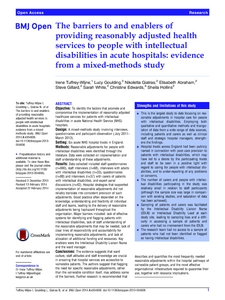Tuffrey-Wijne, I; Goulding, L; Giatras, N; Abraham, E; Gillard, S; White, S; Edwards, C; Hollins, S
(2014)
The barriers to and enablers of providing reasonably adjusted health services to people with intellectual disabilities in acute hospitals: evidence from a mixed-methods study.
BMJ Open, 4 (4).
e004606.
ISSN 2044-6055
https://doi.org/10.1136/bmjopen-2013-004606
SGUL Authors: Gillard, Steven George Hollins, Sheila Clare White, Sarah Jane Edwards, Christine
![[img]](https://openaccess.sgul.ac.uk/107362/1.hassmallThumbnailVersion/The_barriers_providing_adjusted_health_services_to_people_intellectual_disabilities.pdf)  Preview |
|
["document_typename_application/pdf; charset=binary" not defined]
Published Version
Download (1MB)
| Preview
|
Abstract
OBJECTIVE: To identify the factors that promote and compromise the implementation of reasonably adjusted healthcare services for patients with intellectual disabilities in acute National Health Service (NHS) hospitals.
DESIGN: A mixed-methods study involving interviews, questionnaires and participant observation (July 2011-March 2013).
SETTING: Six acute NHS hospital trusts in England.
METHODS: Reasonable adjustments for people with intellectual disabilities were identified through the literature. Data were collected on implementation and staff understanding of these adjustments.
RESULTS: Data collected included staff questionnaires (n=990), staff interviews (n=68), interviews with adults with intellectual disabilities (n=33), questionnaires (n=88) and interviews (n=37) with carers of patients with intellectual disabilities, and expert panel discussions (n=42). Hospital strategies that supported implementation of reasonable adjustments did not reliably translate into consistent provision of such adjustments. Good practice often depended on the knowledge, understanding and flexibility of individual staff and teams, leading to the delivery of reasonable adjustments being haphazard throughout the organisation. Major barriers included: lack of effective systems for identifying and flagging patients with intellectual disabilities, lack of staff understanding of the reasonable adjustments that may be needed, lack of clear lines of responsibility and accountability for implementing reasonable adjustments, and lack of allocation of additional funding and resources. Key enablers were the Intellectual Disability Liaison Nurse and the ward manager.
CONCLUSIONS: The evidence suggests that ward culture, staff attitudes and staff knowledge are crucial in ensuring that hospital services are accessible to vulnerable patients. The authors suggest that flagging the need for specific reasonable adjustments, rather than the vulnerable condition itself, may address some of the barriers. Further research is recommended that describes and quantifies the most frequently needed reasonable adjustments within the hospital pathways of vulnerable patient groups, and the most effective organisational infrastructure required to guarantee their use, together with resource implications.
| Item Type: |
Article
|
| Additional Information: |
This is an Open Access article distributed in accordance with the Creative Commons Attribution Non Commercial (CC BY-NC 3.0) license, which permits others to distribute, remix, adapt, build upon this work non-commercially, and license their derivative works on different terms, provided the original work is properly cited and the use is non-commercial. See: http://creativecommons.org/licenses/by-nc/3.0/ |
| Keywords: |
Science & Technology, Life Sciences & Biomedicine, Medicine, General & Internal, General & Internal Medicine, MEDICINE, GENERAL & INTERNAL |
| SGUL Research Institute / Research Centre: |
Academic Structure > Population Health Research Institute (INPH) |
| Journal or Publication Title: |
BMJ Open |
| ISSN: |
2044-6055 |
| Language: |
eng |
| PubMed ID: |
24740978 |
| Web of Science ID: |
WOS:000335830500013 |
| Dates: |
| Date |
Event |
| 2014-04-16 |
Published |
|
 |
Go to PubMed abstract |
| URI: |
https://openaccess.sgul.ac.uk/id/eprint/107362 |
| Publisher's version: |
https://doi.org/10.1136/bmjopen-2013-004606 |
Statistics
Item downloaded times since 09 Mar 2015.
Actions (login required)
 |
Edit Item |



